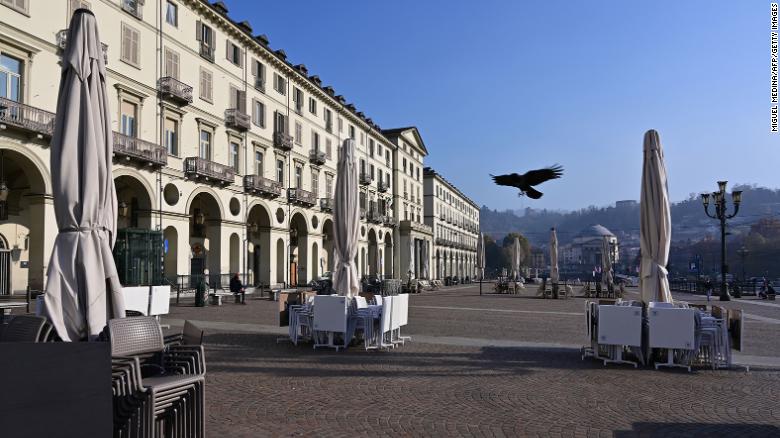By Emma Reynolds, CNN Business Sun December 6, 2020
London (CNN Business)Ros Davies is usually busiest at Christmas, building magnificent sets and stages for London's most sparkling parties and events.
This year, the fairytale is canceled. Davies, a self-employed carpenter hasn't worked since March because of the pandemic and has no idea when she may do so again.
She's living in temporary accommodation found for her in the city by St. Mungo's, a homelessness charity, while a plan to get her into permanent housing is on hold.
"I was hoping to move on and sort my life properly but ... here we are," the 50-year old told CNN Business. "I wouldn't have believed if you had said a year ago that your job's going to stop in March and that's it, you might never work doing that again."

Closed stores in Borough market in Gravesend, England, on Wednesday, December 2 as a national lockdown came to an end but the Kent region remained under stringent restrictions.
Davies did some retraining in painting and decorating, but with England just coming out of a second lockdown it hasn't led to any work. She has gone from regular jobs that paid enough for her to take vacations, to complete reliance on UK social security payments of just over £400 ($530) a month.
"I've really had to lower all of my expectations of life," she said. "If I knew that in a month I'd be working again, or even in spring ... but there doesn't seem to be anything to look forward to."
Coronavirus has revealed gaping holes in European social safety nets that are often seen as the gold standard. While many countries introduced support programs for workers affected by the pandemic, people are falling through the cracks. Most often, those who were already suffering the effects of inequality are hit the hardest — lower-income workers, those in insecure jobs, young people, women and minority ethnic groups.

A closed cafe terrace on Piazza Vittorio Veneto in downtown Turin, Italy, in November.
"Some of the social security systems in Europe are more extensive, better developed [than in the United States]," Michael Spence, a Nobel Laureate and former dean of Stanford Business School, told CNN Business.
He said that during the 2008 financial crisis, pre-existing programs involving governments and businesses helped many European countries avoid too many layoffs.
"But I think in the pandemic economy, the shock's so big that they kind of overwhelm the systems," he said. "The systems weren't built to withstand nearly overnight contractions of 25% in economies."
Unemployment was up by 2.18 million year on year in the European Union in October 2020, rising from a rate of 6.6% to 7.6%. The UK unemployment rate was an estimated 4.8% in the three months to September, up 0.9 percentage points year on year, and 782,000 jobs were lost between March and October, according to the Office for National Statistics.
Insecure work
Lockdowns have seen economies come to an abrupt halt, and benefits systems in many countries have not been able to cope, according to Mike Brewer, chief economist at the Resolution Foundation, a British think tank aimed at reducing inequality.
He said the UK welfare state was "inadequate" for this type of crisis, a downturn far beyond the "natural ebbing and flowing of economic activity" of typical recessions.

Women in the UK already earn less than men. The coronavirus is making that worse
The British welfare system was "not very generous" and relied on a fast-moving labor market, he said. "So it wasn't so much the scale of the pandemic, it was the fact that the pandemic just shut down the labor market ... that's destroyed the premise on which the UK welfare system has been designed."
Since self-employed and casual workers had few protections under pre-crisis systems, many governments have had to come up with emergency measures — but even these programs are inadequate.
The United Kingdom introduced an employee furlough scheme and a self-employment grant. But many workers who are partly or recently self-employed, freelance or on zero-hours or flexible contracts are ineligible for either.
The programs were "designed in a hurry," Brewer said; as the pandemic drags on, the gaps are becoming more evident, and more of a problem.
Hospitality, retail and leisure have been worst affected by lockdowns, sectors in which many informal jobs are held by young, low-income or migrant workers.
The disproportionate impact on these workers, coupled with a lack of government support, means the gap between rich and poor is only widening. Members of low-income households are more likely to be out of work and running down their savings, while those in higher-income households, who are more likely to be in secure jobs that can be done from home, grow wealthier as they spend less, said Brewer.
The people worst affected
Countries that are reliant on tourism, such as Portugal, Greece, Spain and Cyprus, have also faced a battering. The sector is often an entry point into work for women, young people, migrant workers and rural populations — and low-skilled, casual and temporary workers are likely to be the first to lose their jobs, according to a United Nations report.
Youth unemployment increased by 404,000 year on year in the European Union in October, according to Eurostat. The most complete recent data for all countries, from August, shows youth unemployment was highest in Spain, at 41.6%, up almost 9 percentage points. Greece hit 39.3%, Italy 31.4% and Portugal saw an 8.7 percentage point rise to 26.8%.
Brewer says it is "harmful to be out of work for long periods" and can have a long-term impact on future employment prospects so "young people now are going to be carrying that scar as they grow older."

Informal workers are falling through social safety nets, particularly in sectors such as tourism. Pictured, the Acropolis in Athens on November 12 during Greece's second lockdown.
Migrant workers across Europe disproportionately face precarious work and employment conditions, according to the European Federation of Public Service Unions. Joblessness can mean they lose their income, their right to stay in a country and even their homes without access to social benefits — so they are particularly likely to have to risk their health by continuing work. Undocumented migrants do not qualify for any protections.
Abigail Adams-Prassl, an associate professor in economics at the University of Oxford, told CNN Business that women and Black, Asian and other minority ethnic workers were also more likely to slip through the cracks.
"Insecure work and work in vulnerable sectors such as social care is disproportionately done by non-White groups in Britain," she said, adding that there was good evidence that "people who identify as non-White face a bigger economic shock than those identified as White."
This is coupled with the fact that they are more likely to become seriously ill or die from Covid-19.
Adams-Prassl said the ability to work from home also depends on domestic duties.

These families cherished multi-generational living. But Covid-19 has wrecked it
Childcare falls disproportionately on women, and the virus has often meant that children cannot attend school or childcare, says Adams-Prassl. She said the pandemic has exacerbated the financial shortfall for many UK childcare providers and there had been "nothing in terms of a targeted package of support for that sector or thinking about how to really support the employment of caregivers."
Women's groups have repeatedly raised the issue that social security systems can be problematic for those in abusive relationships, she added. "If you've got a partner who didn't lose their job, or who might have savings of their own, that can mean that you're ineligible for these forms of government support," said Adams-Prassl, adding that these patterns were also seen in France and Italy.
"All of these things existed beforehand," she said. "It's the fact that I guess it has affected many more people over the pandemic and it's just been so stark has made many, many more people aware of these issues. I think there's still a very long way to go in terms of thinking about what the policy response is."
Increasing existing inequalities
In Italy, this inequality can be seen in stark relief along geographical lines. While the richer north of the country was initially hit the hardest by the pandemic, the financial damage has been worst for the poorest households, which are more widespread in the south, according to the Bank of Italy.
Employment has dropped more in the south, where people are more likely to be in temporary jobs or roles that are more exposed to the effects of the pandemic, the November report found.
The government launched loans, subsidies and wage supplementation programs in March, but Valentina Meliciani, director of the Luiss School of European Political Economy in Rome, says high levels of public debt gave the country "a limited capability to respond to the crisis" and reach everyone.

Borrowing is dirt cheap. These countries are cashing in
Women's groups have repeatedly raised the issue that social security systems can be problematic for those in abusive relationships, she added. "If you've got a partner who didn't lose their job, or who might have savings of their own, that can mean that you're ineligible for these forms of government support," said Adams-Prassl, adding that these patterns were also seen in France and Italy.
"All of these things existed beforehand," she said. "It's the fact that I guess it has affected many more people over the pandemic and it's just been so stark has made many, many more people aware of these issues. I think there's still a very long way to go in terms of thinking about what the policy response is."
Increasing existing inequalities
In Italy, this inequality can be seen in stark relief along geographical lines. While the richer north of the country was initially hit the hardest by the pandemic, the financial damage has been worst for the poorest households, which are more widespread in the south, according to the Bank of Italy.
Employment has dropped more in the south, where people are more likely to be in temporary jobs or roles that are more exposed to the effects of the pandemic, the November report found.
The government launched loans, subsidies and wage supplementation programs in March, but Valentina Meliciani, director of the Luiss School of European Political Economy in Rome, says high levels of public debt gave the country "a limited capability to respond to the crisis" and reach everyone.

Borrowing is dirt cheap. These countries are cashing in
"Government interventions worked in the formal sector but less so with informal sector workers," she said, citing the examples of the tourism sector and migrant workers. "The problem is that it is very difficult to catch these people because they do not show up at all in the statistics."
She said Italy was already a "quite divided country" with the North and the center on one side, and the Mezzogiorno (south) on the other.
The southern region is fast becoming poorer. Public policies are less effective, students are lagging behind in education and fewer homes have fast broadband.
Meliciani said the southern regions "will suffer the most" in the long term. She said that to stop poverty increasing after the pandemic, government policies must address structural problems in the south, including the digital divide.
She said companies in the south needed incentives or tax relief to allow them to invest in digital technologies or other areas that could help them survive the crisis.
Modeling led by Oxford University in July found that two months of lockdown plus six months of restrictions would result in a mean wage loss rate for the poor of up to 16.2%. Cyprus was the European country where inequality increased most under several different pandemic scenarios, with a loss rate of up to 22.4% for the poor.
"There is considerable inequality in Cyprus in terms of income, wealth, employment, opportunities, and what I would call intergenerational gaps," Leslie Manison, a former senior economist at the International Monetary Fund and ex-advisor in the Cyprus Ministry of Finance, told CNN Business.
He said the government had introduced measures such as subsidizing salaries of employees in companies that had suspended their operations, and people in the informal sector often weren't eligible despite being worse affected by Covid.
"The subsidies haven't been connected, you could say, with active labor policies on retraining and so on, compared with a country like Germany," he added.
No comments:
Post a Comment